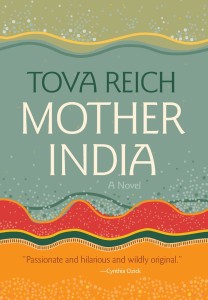The Lilith Blog 1 of 2
February 13, 2019 by Yona Zeldis McDonough
A Novel Satirizes Jews and India
 Mother India is a novel that offers a rich, kaleidoscopic view of both the titular country and its multi-faceted culture. The religious Jews who populate the novel add yet another layer of complexity. Fiction Editor Yona Zeldis McDonough talks to author Tova Reich about how the India-Jewish connection has shaped her thinking and her work.
Mother India is a novel that offers a rich, kaleidoscopic view of both the titular country and its multi-faceted culture. The religious Jews who populate the novel add yet another layer of complexity. Fiction Editor Yona Zeldis McDonough talks to author Tova Reich about how the India-Jewish connection has shaped her thinking and her work.
YZM: Tell us something about your own relationship to India.
TR: One of my major preoccupations, I’ve always felt, is religion (and not only Judaism), its ultimately tragic human quest for meaning, and what seems to be its inevitable apocalyptic thrust toward extremism and zealotry. I’ve written about seekers in Israel in my novel Master of the Return, about political fanaticism in my novel The Jewish War, and what might perhaps be called social extremism played out in the marginalization/suppression of women in my novel One Hundred Philistine Foreskins.
In Mother India, all of these themes and more come together to seriously combustible (but also, I hope, hilarious and heartbreaking) consequences. The connection between Indians and Jews, India and Israel, has always been powerful for me—two ancient peoples shaped by ancient texts (bava kama, kama sutra, as one of my characters says), two dynamic, in-your-face diaspora communities, two states released from British rule in 1947/48 and partitioned with catastrophic consequences that plague them down to this day.
YZM: Do you feel many Jews are attracted to India for this reason?
TR: For some of my characters—in Mother India, seekers like the narrator Meena and her family—the attraction to India is, I think, in many ways similar to what pulls certain people to Israel and maybe ultimately disappoints them: a search for spirituality, connection, meaning, enlightenment, inner peace, often misguided or deluded.
YZM: You depict Jewish Orthodox life in a highly unorthodox way; care to comment?
TR: Orthodox is what I know, so I write about it from the inside and with some authority. I also write from the inside about religion and ideologies in general, fanaticism, extremism, women, mothers, daughters, sisters, wives, the uses and abuses of children, men, families, love, sex, illness, loss, death, and so on— all of which and more also populates the pages of Mother India. My vision is essentially tragic, which perhaps helps to explain the darkly comic voice of my writing.
YZM: I’m intrigued by the premise of your 2007 novel, My Holocaust; can you tell us a bit about it?
TR: One thing My Holocaust is not about is the “Holocaust” itself, a subject that defeats the imagination. If the novel has a premise at all, it’s the crass misuse, exploitation and commodification of the memory and memorialization of the Shoah, mostly by Jews, and—not to discriminate against the rest of humankind—the cynical attempts by non-Jews to grab a piece of the Holocaust for their own uses.
YZM: What’s a question you wish I’d asked?
TR: Something about how the novel has been received in India, so that I could tell you that there has been interest there, and indeed an India edition will be coming out from Macmillan India in time for the Jaipur Literature Festival at the end of January, to which I’m looking forward!
 Please wait...
Please wait...